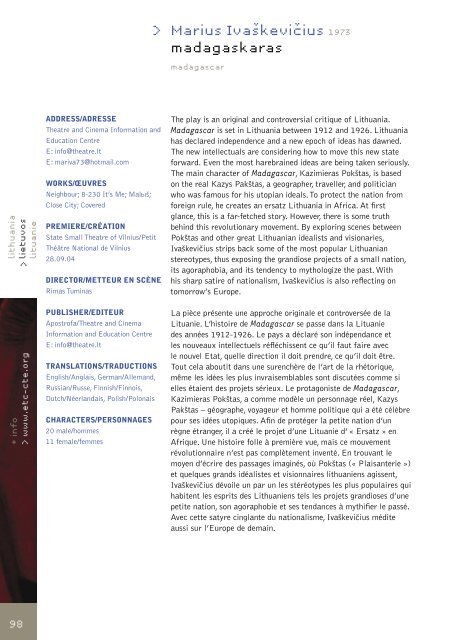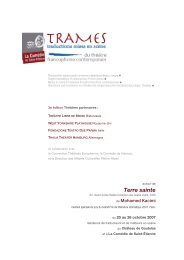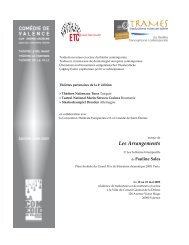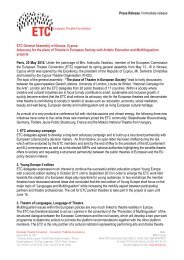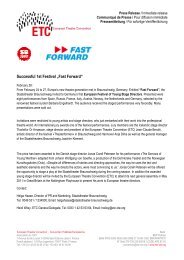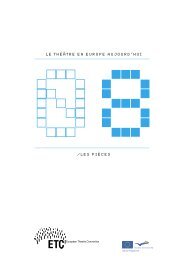Le théâtre en Europe aujourd'hui - European Theatre Convention
Le théâtre en Europe aujourd'hui - European Theatre Convention
Le théâtre en Europe aujourd'hui - European Theatre Convention
You also want an ePaper? Increase the reach of your titles
YUMPU automatically turns print PDFs into web optimized ePapers that Google loves.
lithuania<br />
> lietuvos<br />
lituanie<br />
+ info<br />
> www.etc-cte.org<br />
98<br />
><br />
ADDRESS/ADRESSE<br />
<strong>Theatre</strong> and Cinema Information and<br />
Education C<strong>en</strong>tre<br />
E: info@theatre.lt<br />
E: mariva73@hotmail.com<br />
WORKS/ŒUVRES<br />
Neighbour; 8-230 It’s Me; Mal š;<br />
Close City; Covered<br />
PREMIERE/CRÉATION<br />
State Small <strong>Theatre</strong> of Vilnius/Petit<br />
Théâtre National de Vilnius<br />
28.09.04<br />
DIRECTOR/METTEUR EN SCÈNE<br />
Rimas Tuminas<br />
PUBLISHER/EDITEUR<br />
Apostrofa/<strong>Theatre</strong> and Cinema<br />
Information and Education C<strong>en</strong>tre<br />
E: info@theatre.lt<br />
TRANSLATIONS/TRADUCTIONS<br />
English/Anglais, German/Allemand,<br />
Russian/Russe, Finnish/Finnois,<br />
Dutch/Néerlandais, Polish/Polonais<br />
CHARACTERS/PERSONNAGES<br />
20 male/hommes<br />
11 female/femmes<br />
Marius Ivaškevicius 1973<br />
madagaskaras<br />
madagascar<br />
The play is an original and controversial critique of Lithuania.<br />
Madagascar is set in Lithuania betwe<strong>en</strong> 1912 and 1926. Lithuania<br />
has declared indep<strong>en</strong>d<strong>en</strong>ce and a new epoch of ideas has dawned.<br />
The new intellectuals are considering how to move this new state<br />
forward. Ev<strong>en</strong> the most harebrained ideas are being tak<strong>en</strong> seriously.<br />
The main character of Madagascar, Kazimieras Pokštas, is based<br />
on the real Kazys Pakštas, a geographer, traveller, and politician<br />
who was famous for his utopian ideals. To protect the nation from<br />
foreign rule, he creates an ersatz Lithuania in Africa. At first<br />
glance, this is a far-fetched story. However, there is some truth<br />
behind this revolutionary movem<strong>en</strong>t. By exploring sc<strong>en</strong>es betwe<strong>en</strong><br />
Pokštas and other great Lithuanian idealists and visionaries,<br />
Ivaškevicius strips back some of the most popular Lithuanian<br />
stereotypes, thus exposing the grandiose projects of a small nation,<br />
its agoraphobia, and its t<strong>en</strong>d<strong>en</strong>cy to mythologize the past. With<br />
his sharp satire of nationalism, Ivaškevicius is also reflecting on<br />
tomorrow’s <strong>Europe</strong>.<br />
La pièce prés<strong>en</strong>te une approche originale et controversée de la<br />
Lituanie. L’histoire de Madagascar se passe dans la Lituanie<br />
des années 1912-1926. <strong>Le</strong> pays a déclaré son indép<strong>en</strong>dance et<br />
les nouveaux intellectuels réfléchiss<strong>en</strong>t ce qu’il faut faire avec<br />
le nouvel Etat, quelle direction il doit pr<strong>en</strong>dre, ce qu’il doit être.<br />
Tout cela aboutit dans une sur<strong>en</strong>chère de l’art de la rhétorique,<br />
même les idées les plus invraisemblables sont discutées comme si<br />
elles étai<strong>en</strong>t des projets sérieux. <strong>Le</strong> protagoniste de Madagascar,<br />
Kazimieras Pokštas, a comme modèle un personnage réel, Kazys<br />
Pakštas – géographe, voyageur et homme politique qui a été célèbre<br />
pour ses idées utopiques. Afin de protéger la petite nation d’un<br />
règne étranger, il a créé le projet d’une Lituanie d’ « Ersatz » <strong>en</strong><br />
Afrique. Une histoire folle à première vue, mais ce mouvem<strong>en</strong>t<br />
révolutionnaire n’est pas complètem<strong>en</strong>t inv<strong>en</strong>té. En trouvant le<br />
moy<strong>en</strong> d’écrire des passages imaginés, où Pokštas (« Plaisanterie »)<br />
et quelques grands idéalistes et visionnaires lithuani<strong>en</strong>s agiss<strong>en</strong>t,<br />
Ivaškevicius dévoile un par un les stéréotypes les plus populaires qui<br />
habit<strong>en</strong>t les esprits des Lithuani<strong>en</strong>s tels les projets grandioses d’une<br />
petite nation, son agoraphobie et ses t<strong>en</strong>dances à mythifier le passé.<br />
Avec cette satyre cinglante du nationalisme, Ivaškevicius médite<br />
aussi sur l’<strong>Europe</strong> de demain.


